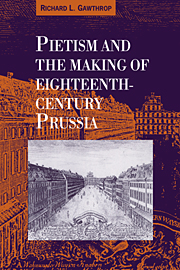Book contents
- Frontmatter
- Contents
- Preface
- Introduction
- 1 The German territorial state in the sixteenth and seventeenth centuries
- 2 Reformed confessionalism and the reign of the Great Elector
- 3 The nature of the pre-1713 Hohenzollern state
- 4 Lutheran confessionalism
- 5 Spenerian Pietism
- 6 From Spener to Francke
- 7 Halle Pietism I: ideology and indoctrination
- 8 Halle Pietism II: growth and crisis
- 9 Pietist–Hohenzollern collaboration
- 10 The impact of Pietist pedagogy on the Prussian army and bureaucracy
- 11 Civilian mobilization and economic development during the reign of Frederick William I
- Conclusion
- Bibliography
- Index
11 - Civilian mobilization and economic development during the reign of Frederick William I
Published online by Cambridge University Press: 14 October 2009
- Frontmatter
- Contents
- Preface
- Introduction
- 1 The German territorial state in the sixteenth and seventeenth centuries
- 2 Reformed confessionalism and the reign of the Great Elector
- 3 The nature of the pre-1713 Hohenzollern state
- 4 Lutheran confessionalism
- 5 Spenerian Pietism
- 6 From Spener to Francke
- 7 Halle Pietism I: ideology and indoctrination
- 8 Halle Pietism II: growth and crisis
- 9 Pietist–Hohenzollern collaboration
- 10 The impact of Pietist pedagogy on the Prussian army and bureaucracy
- 11 Civilian mobilization and economic development during the reign of Frederick William I
- Conclusion
- Bibliography
- Index
Summary
In 1713 Frederick William I inherited from his father an economic system in which growth was dependent mainly on foreign subsidies for the army and the inflow of skills and capital from religious refugees. Although the Peace of Utrecht (1713) portended an extended period of international stability, the generation of war that preceded it (1688–1713) had left the Prussian state with a valuable asset – an experienced army considerably larger than one would expect from a country of Prussia's size and level of economic development. As an asset, however, this fighting force was highly specific: that is, it possessed a much higher value in its intended use than in other possible uses. With the impending end of English and Dutch subsidy payments, the collapse of the market for the thirty-five thousand man Prussian army seemed inevitable. Frederick I was prepared to accept the loss and cut back the size of his military establishment; but his death in early 1713, occurring shortly before this order would have gone into effect, gave his son the opportunity to maintain the army's size. No one expected Frederick William I to be able to accomplish even this limited aim, though, since it did not seem possible for the Prussian state's finances to pay the army's wages, let alone provide it with food, equipment, and munitions.
Yet Frederick William intended to do precisely that, to purchase the services of his own army and organize the domestic economy around supplying its needs.
- Type
- Chapter
- Information
- Pietism and the Making of Eighteenth-Century Prussia , pp. 247 - 269Publisher: Cambridge University PressPrint publication year: 1993



